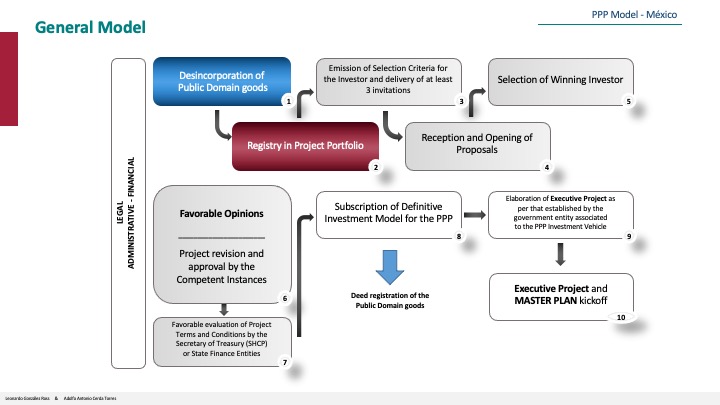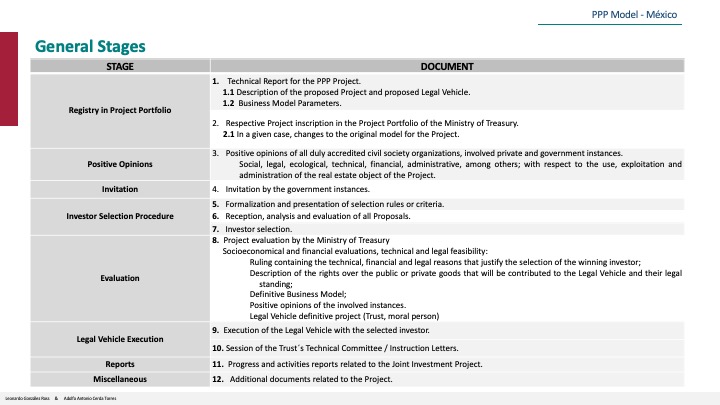Public-Private Partnerships
A Guide to Public-Private Partnerships
Public-Private Partnerships in Mexico
Public-private partnerships may become the chosen model for future infrastructure projects in Mexico in the coming years. One of the strategic objectives of the Federal Government and States is to promote the construction of new infrastructure and improving existing infrastructure.
As a result of COIVD, the economic turmoil, and policy decisions, the federal and state governments will no longer be able to undertake projects solely with public funds. In short, Mexico needs the private sector’s participation to increase and improve all infrastructure.
During the last couple of decades, the Public-Private Partnerships model has been adopted with an ever-increasing number of successful cases.
Mexico has to offer very competitive conditions for the participation of the private sector in the development of infrastructure projects, such as:
- A continued commitment to public investment;
- A defined strategy and long term planning;
- Diversity and availability of financing sources, both public and private; and,
- Solid institutions and legal framework.
Of course, foreign investors interested in participating in a Public-Private Partnership must adequately assess the peculiarities of the Mexican market and how to integrate correctly into the investment cycle in each of the infrastructure sectors.
Government Strategy on Infrastructure Project
Through a series of national programs and plans, Mexico offers potential investors medium and long-term visibility with respect to the development of infrastructure projects. The infrastructure plans include the general to the technical particularities of each infrastructure sector.
These planning documents show how the sector is standing, its place in the global market, its specific needs, as well as its goals and objectives for the future.
Mexico’s Federal Infrastructure Plan 2018-2024
In line with the National Development Plan, the National Infrastructure Plan for 2018 – 2024 sets medium-term objectives and strategies. This document guides policy-makers towards comprehensive projects between existing and new infrastructure projects, having in mind specific objectives in the following sectors:
-
- Communications and Transport
- Energy
- Hydraulic
- Health
- Urban Development and Housing
- Tourism
The Public-Private Partnership Model
Public-Private Partnership Model in Mexico
Public-private partnerships are created with the purpose of establishing a long-term contractual relationship between the public sector and a private party. The purpose of a public-private partnership may consist of providing services to the government, intermediaries or the final users. In the end, the private party will provide services or infrastructure that, in theory, should increase the social welfare and levels of investment in Mexico.
The Mexican government, either federal or state, has to thoroughly justify a Public-Private Partnership project. In particular, the government has to specify the social benefits and prove that the public-private partnership has a clear financial advantage vis-a-vis other means of project financing.

The Process for a Public-Private Partnership
The First Steps for a Public-Private Partnership in Mexico
First, the interested public body must determine the viability of the project and the public-private partnership. Then, the government body must register the project in the Investment Portfolio of the Ministry of Treasury or Finance, either Federal or State. The public body must include in its assessment the social cost-benefit analysis and a public-private comparison report (e.g. Financial and Technical Results).
Afterward, the Inter-Ministerial Commission for Financing and Expenditure must authorize the project and determine its preferential status regarding the order of execution of all projects.
The Ministry of Treasury, either federal or local, must include a budget estimation of the maximum allowed expenditure for the proposed and approved projects. In turn, the Federal and Local House of Representatives has to approve the budgetary sufficiency.
Finally, the Private-Public Partnership project is subject to procedures that are common to government tenders or bids, namely direct assignment, three-party invitation, or public tenders.

Unsolicited Proposals
Submitting a Public-Private Partnerships Project
With respect to certain projects, any party interested in carrying out a public-private partnership project may present their proposal to a Federal or Local Entity or Department.
Entities or Departments may highlight the sectors, sub-sectors, geographical area, or projects that may be subject to a public-private partnership unsolicited proposal in a public document.
The interested party submitting an unsolicited proposal gives him the right to having the proposal assessed by the government body. However, the government body will decide if the unsolicited proposal is acceptable or not. If positive, the government body will issue a tender regarding the project and purchase the studies submitted by the interested party.
The interested party may receive an expense reimbursement equivalent to 4 % of his initial investment in the event that he does not participate in the tender or the project is not assigned to him.
The reimbursement certificate may not proceed when, for instance, the tender is not issued due to circumstances related to the interested party, the project is not assigned to him, or the government body decides not to purchase the studies.
Cost-Benefit Analysis
Before assigning a Public-Private Partnership in Mexico, the relevant government body will carry out the following analysis:
Risk Analysis in Public-Private Partnerships
The risk analysis consists of identifying the project associated risks, classifying said risks through their occurrence feasibility, analyzing their impact on the execution, and possible relief measures.
Eligibility Index in Public-Private Partnerships
The Government Body must create a workgroup for each project, which has to comprise at least seven public servants. This workgroup will make decisions that impact the development or execution of the public-private partnership project.
Value for Money Analysis in Public-Private Partnerships
The Government Body estimates the value for money through a Public-Private comparator. This report evaluates if the public-private partnership creates equal or better net-benefits than a project funded entirely by the government, incorporating any reasonably expected efficiencies, and taking into consideration all risks and allocating such risks.
Public-Private Partnership Contracts
Mexican Law promotes flexible contractual mechanisms with an even distribution of risks and clarity about the rights and obligations of the parties involved in a private-public partnership contract.
All rights and obligations regarding the execution of the project may be allocated to the government body, the private party, or both. Once the contract is executed, amendments to the contract are possible as long as they do not represent a transfer of risk.
Normally, Public-Private Partnerships contracts in Mexico include the following clauses:
- Adjustments to agreed compensation;
- Additional income generators and their purpose;
- Subcontracting rights for the project and services;
- Transfer of rights;
- Complementary activities to be performed at the end of the contract;
- The destiny of the goods or inventory at the end of the contract.
The Public-Private Partnerships contracts are formalized through a service development contract and can be complemented, if necessary, with a construction execution contract, which will include any necessary concessions, permits, and licenses to be granted by the contracting Government Body.
If the private party or developer fails to meet his obligations and/or endangers the development of the project, the contracting Government Body may intervene.
The law allows early termination of Private-Public Partnership contracts. However, the parties must agree on the termination clauses and, of course, must be included within the service development contract, which will provide all legal principles, terms, and conditions under which either party may terminate the contract.
Contributor
Leonardo J. González Ross
Mr. Leonardo Gonzalez is a consultant focused on the development and promotion of business models, financial projects, and public-private partnerships. He has multidisciplinary experience in operations, finance, sales, and human resources in sectors such as infrastructure, technology, services, security, and consumer products.
With over 30 years of experience in strategic projects in the public and private sector, Mr. Leonardo González implemented successfully automatized bank branches and created the new model of public-private partnerships in Mexico.

Why Investing in Mexico?
What is the current political and economic environment in Mexico?
Competitiveness Ranking
A summary regarding Mexico's positive and negative indicators according to the World Bank and the World Economic Forum.
Land for Industry
What you need to know when purchasing or leasing land for industrial purposes in Mexico.
Security in Mexico
An honest review of the security situation for businesses in Mexico.
Visit Our Other Guides:
International Trade Guide
Tariffs, FTAs, Duty Deferral Instruments, Taxes Affecting Imports, Non-Tariff Barriers, Customs, and more!
Foreign Investment Guide
When Do Foreign Investment Restrictions Apply?
IMMEX / Manufacturing Guide
The IMMEX program explained, plus the VAT / IEPS certification and the Authorized Economic Operator.
Get In Touch With Us!
Phone
+ 52 55 1683 2289
Address
Rio Churubusco 601, Col. Xoco, Benito Juarez, Mexico City.
